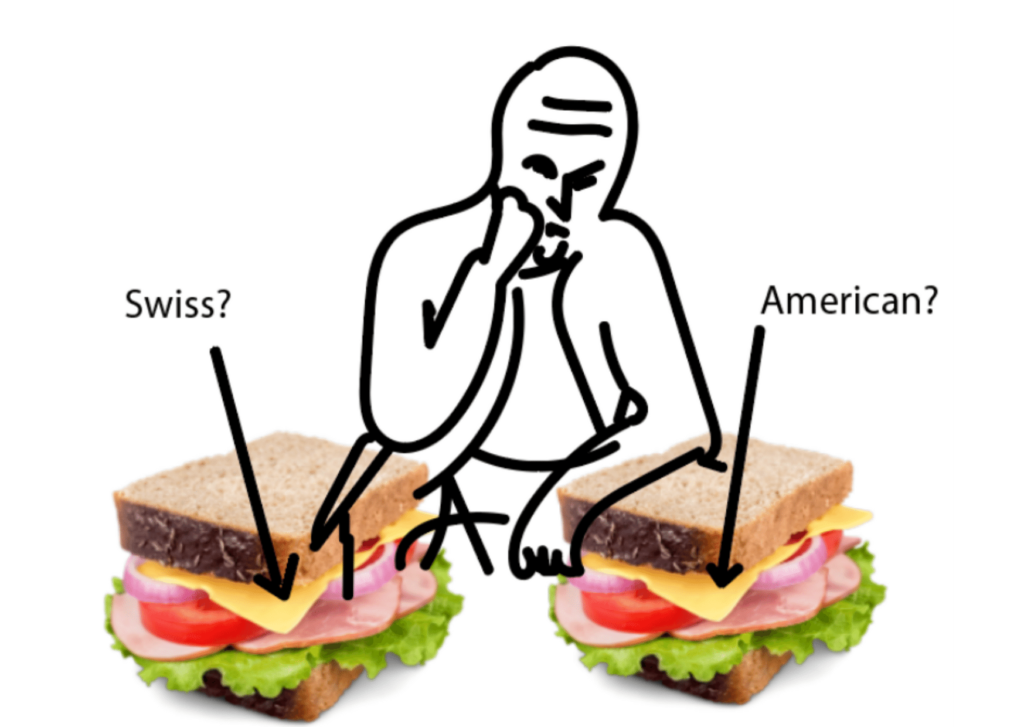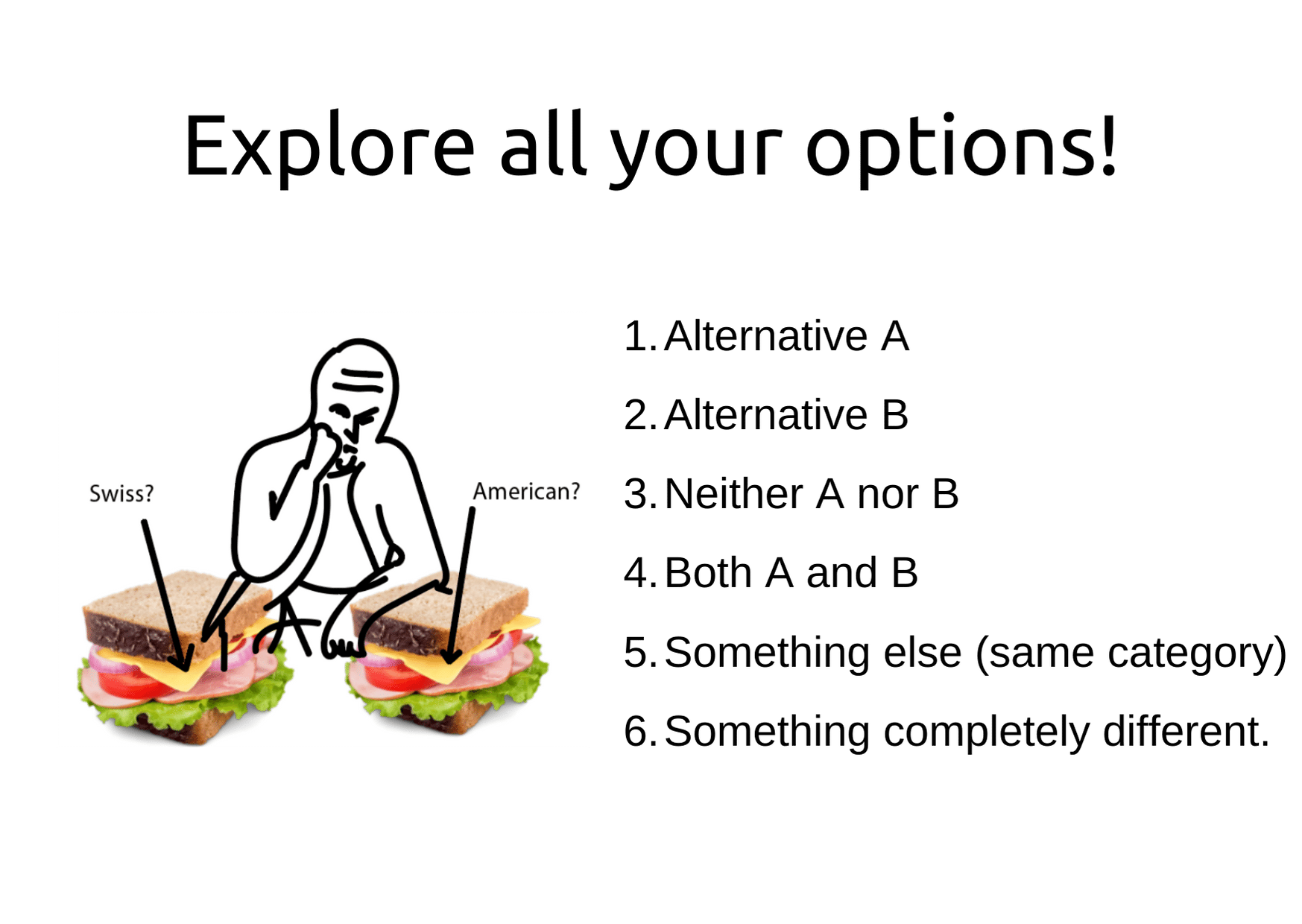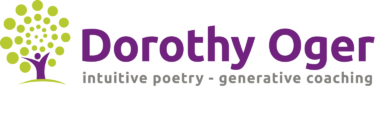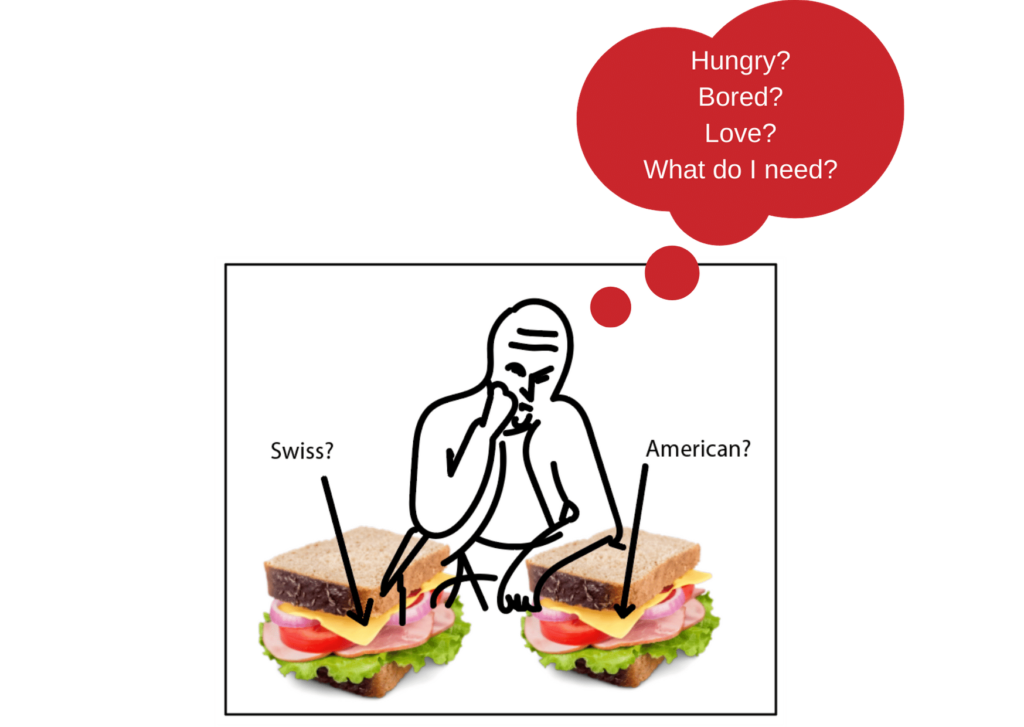If you are wondering what my "why" is, have a look at this poem. I…
Tired of Your Life’s Dilemmas? Learn How to Cut Gordian Knots.
A popular and divisive question at the moment is whether to get COVID-19 vaccinated or not.
This question is dualistic. Either you are pro-vaccination, or you are against it, 100% right or wrong. Many factors are in play, and I am in a dilemma.
According to the Cambridge Dictionary, a dilemma is “a situation in which a difficult choice has to be made between two different things you could do.”
A dilemma is never a good option.
Life is rarely as simple as a choice between A or B.
Let me give you a mundane example:
The first time I bought a sandwich in the States, I was asked, “Swiss or American?”. I did not understand the question right away. My soft voice and Belgian accent only created more confusion.

Choosing the type of cheese to put on your bread does not qualify as a difficult choice, but let’s assume it is. You cannot decide between two opposing alternatives: option 1 (Swiss) OR option 2 (American).
Let’s break out of this heartbreaking dilemma!
I like to use the tetralemma model with four alternatives and a twist:
- Option 1 = Alternative A (Swiss cheese)
- Option 2= Alternative B (American cheese)
- Option 3 = Neither (no cheese)
- Option 4 = Both A+B (Swiss and American), in varying degrees (half/half, one-third/two-thirds, etc.)
Here is the twist, Option number 5, “Something else.”
- Consider having soup, a boiled egg, a pasta dish instead.
- Are you even hungry? Perhaps you are buying the sandwich out of habit. Your hesitation is a clue.
- Do you resort to eating because you are bored? Looking for some comfort? What can you do for yourself instead of eating?
In the US version of the series “Designated Survivor,” the President, played by Kiefer Sutherland, gets asked to make terrible choices between two alternatives.
Sutherland takes time to reflect. He resists the pressure to decide one way or another. The President listens carefully, identifies the implicit motivation and core values of the involved parties. He calls upon external help, and, eventually, the President surprises everyone with a third alternative.
I am sure his mantra is, “There is always a third option.” (And it’d better be a win-win for all involved.)
How can you apply this for yourself?
For more complex and delicate choices, assume there is a third option. Your assumption may yield a better alternative. If not, you will, at the very least, make an informed decision. The other day, I jokingly asked a friend: “Is this a promise or a threat?”. She answered: “It is hope.” Hope is neither promise nor threat; it is something else.
Give yourself time to find out what you don’t want to lose, what is crucial in both options. Sleeping on it will improve the quality of your decision. Perhaps you wait (a bit) for something decisive to happen. Or you forego on both.
“Slow is smooth, and smooth is fast.” US Navy Seals.
See if you can combine both alternatives A & B. You can mix-and-match A and B: 60% A + 40% B, for example. You can start freelancing and retain your ex-company as a new client. You can stay with your current employer and move to a position that fulfills your freelancing dreams.
Explore your real needs and motivations (hungry? bored? comfort?), and look for ways to fulfill those before your re-visit your options. For more insight, aim to understand other people’s needs and values.
Ask for help. Peers may help you understand your dilemma and explore alternatives. Sometimes just being with you as you are going through that difficult choice is the best help you may need.
Ask your body. Check with your intuition. I am focusing this article on a mostly cognitive process. But your intellect is not your only recourse when it comes to complex decisions. I will be writing some more about different ways of exploring options and decisions.
An extra tip: Limit the number of decisions you make per day as it drains your mental energy. Automate and simplify as many mundane choices as possible. Steve Jobs always wore a black turtle-neck to focus on the more challenging decision. You could go for Swiss cheese by default, as long as you keep your mental energy for difficult decisions.
A bonus tip: Clarify your hierarchy of values and identify guiding principles to help you with lower-level choices. I often go for the options that provide more opportunities, more freedom, more room for development.
So what about the COVID-19 vaccine?
If you are under stress — as we probably all are during this pandemic —, zoom fatigued with depleted mental energy, you will likely postpone your decision until it is forced upon you. If not, you will opt for the choice you consider to be safest for you and your family.
This survey of experienced parole judges in Israël demonstrates that tiredness, and the depletion of mental energy, affect their decision:
“We find that the percentage of favorable rulings drops gradually from ≈65% to nearly zero within each decision session and returns abruptly to ≈65% after a break.” Shai Danziger, Jonathan Levav, and Liora Avnaim-Pesso
How can you increase the quality and scope of your decision-making process?
- Include considerations about the type of vaccine available. With 200 candidate vaccines in development as per WHO, some additional research is useful. The synthetic mRNA vaccine is the newest way of developing vaccines. Due to COVID-19, it has received emergency use authorization for injection to people, in addition to using in clinical trials. It will be easier to make up your mind once you have a clearer understanding of what is there. Perhaps we can exert some influence on which vaccine to get.
- Do like Tim Ferriss on politics, and ask their opinions from people you trust, who are pro/con. In addition to receiving additional insight, you will get precious information on their values and reasoning.
- Prepare yourself mentally and physically before getting the injection (boost your immune system, use mental visualization, meditate, do some relaxation exercise).
- Neutralize the adverse effects and reinforce the positive response of your body after the injection. This tip comes from a friend’s ayurvedic doctor.
- Be willing to re-assess your decision at any time because a) you will be more informed later on, b) your decision doesn’t have to be perfect right now c) situations change.
- This is a starting point.
Takeaway
You have more options than you think you have, but you need to give it time and attention.
As you start exploring these options, you will find yourself more resourceful, creative, energized, relieved, and in charge of your own life.
Even if you don’t choose, you will feel more resilient.




